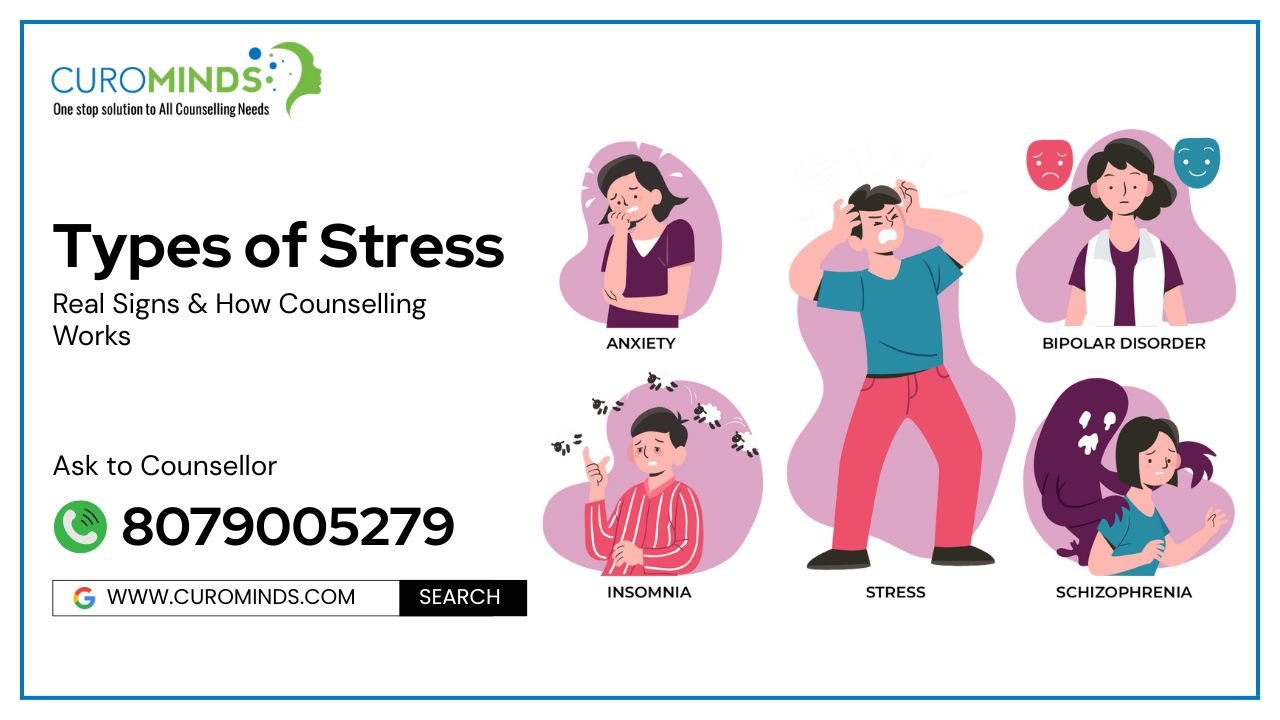Stress isn’t one single feeling. It shows up in different forms depending on what you’re going through, how long it has been building up, and how your mind and body handle pressure. Understanding the type of stress you’re dealing with is the first step, and counselling helps you work through each one in a structured, practical way.
Stress comes in different forms such as acute stress, chronic stress, emotional stress, workplace stress, academic stress, and relationship-related stress. Counselling helps by identifying triggers, reshaping thought patterns, and teaching coping tools tailored to each type.
Types of Stress Explained
From acute to chronic stress, see how stress counselling supports each type with simple techniques, real-life examples, and expert-backed clarity.
1. Acute Stress
Acute stress is the sudden, shortburst kind. Your boss gives you an unexpected deadline. You’re stuck in traffic before a meeting. Your child falls sick suddenly. The body reacts fast — racing heartbeat, sweaty palms, sudden tension.
Common signs:
- irritability
- headaches
- breathlessness
- temporary loss of focus
A quick example: Meera is driving to an interview in Bengaluru when a sudden traffic jam brings everything to a halt. She’s already cutting it close. Her heart starts racing, her palms sweat, and she keeps checking the clock. The stress hits hard… but only for that moment.
How counselling helps: A counsellor helps you understand how your mind reacts to sudden pressure. You learn grounding techniques, breathing methods, and quick stabilising routines so you can recover faster instead of spiralling.
2. Episodic Acute Stress
Some people face acute stress so frequently that it becomes a pattern — weekly deadlines, unpredictable workloads, sudden family issues, financial instability. It’s stress in installments.
Common signs:
- frequent worrying
- irritability
- disrupted sleep
- feeling “always on edge”
A quick example: Rohit works in sales. His targets reset every Monday, and the pressure builds all over again. The moment he finishes one deal, there’s a new call, a new client, a new deadline. Every week feels like a mini-crisis. He sleeps poorly before month-end and wakes up thinking about pending tasks.
How counselling helps: You learn to identify patterns in your lifestyle that create repeated pressure. A counsellor works with you to build better routines, restructure expectations, set boundaries, and reduce unnecessary triggers.
3. Chronic Stress
This is the heavy one — stress that lingers for months or years. It often comes from long-term issues like job insecurity, ongoing relationship conflict, caregiving pressure, or unresolved emotional wounds.
Common signs:
- emotional fatigue
- withdrawal from people
- constant headaches or body pain
- loss of motivation
- feeling stuck or helpless
A quick example:
Neha has been supporting her parents financially for years while dealing with a demanding job. She’s been feeling drained for months — no interest, no energy, just a constant heaviness. She doesn’t remember the last time she felt relaxed. This isn’t a bad week; it’s become her normal.
How counselling helps:
Counsellors guide you through deeper work: exploring long-term patterns, reshaping thinking styles (CBT), and building healthier coping systems. You also learn how to break long-standing cycles that keep stress alive.
4. Workplace Stress
Workload, late-night calls, unrealistic targets, lack of support, or office politics — workplace stress is one of the most common in India, especially among corporate teams and IT professionals.
Common signs:
- trouble focusing
- difficulty switching off after work
- tension in the neck, jaw, or shoulders
- burnout-like exhaustion
- feeling undervalued or overwhelmed
A quick example: Amit works in an IT company with US clients. Calls at 11 PM are normal. His manager expects him online even on weekends. He tries to keep up, but the pressure builds until he dreads opening his laptop every morning. His mood at home is affected, and small requests irritate him.
How counselling helps: A counsellor helps you set boundaries, manage expectations, approach conflict more confidently, improve focus, and build a healthier mindset towards work. You also explore ways to balance work pressure without crashing.
5. Academic Stress (Students)
Students deal with exam pressure, competitive environments, performance anxiety, and the fear of disappointing parents. Add screens and distractions, and the stress multiplies.
Common signs:
- poor concentration
- feeling overwhelmed before exams
- self-doubt
- sleep disturbances
- irritability
A quick example: Riya is preparing for NEET. Every hour feels important, every chapter feels incomplete. Her friends post their mock scores online, and she compares herself constantly. She studies but can’t focus. Before exams, her stomach hurts and she can’t sleep.
How counselling helps: Counselling gives students tools to plan better, manage expectations, handle competition, and calm performance anxiety. It also helps them understand what’s realistically achievable instead of carrying invisible pressure.
6. Emotional Stress
Emotional stress comes from internal struggles — unresolved feelings, long-term worry, guilt, fear of failure, or ongoing uncertainty. It doesn’t always have a clear external trigger.
Common signs:
- emotional heaviness
- difficulty expressing feelings
- negative self-talk
- overthinking
- sudden emotional breakdowns
A quick example: Saurabh looks fine to everyone. But inside, he carries guilt, fear of disappointing his family, and a constant sense of “not being enough.” Nothing major happened, but emotions pile up silently. He overthinks every decision and feels exhausted without clear reasons.
How counselling helps: You unpack the emotional load in a safe space. A counsellor helps you differentiate temporary emotions from deeper patterns, teaches emotional regulation, and helps you rebuild inner stability.
7. Relationship Stress
Relationship stress isn’t only for couples — it can involve family, parents, siblings, or friendships. Miscommunication, unmet expectations, financial pressure, and changing roles all contribute.
Common signs:
- frequent arguments
- emotional withdrawal
- feeling unheard or misunderstood
- insecurity
- stress during conversations
A quick example: A married couple, Aisha and Kabir, keep arguing about small things — finances, time, responsibilities. Neither feels heard. They both love each other but can’t communicate without tension. Even simple conversations turn into stress.
How counselling helps: Counselling improves communication, helps people understand their emotional needs, and reduces conflict. Couples learn how to listen without reacting, set healthier expectations, and work through disagreements.
8. Financial Stress
Financial pressure can quietly affect an entire household. This includes debt, job loss, income insecurity, or sudden expenses.
Common signs:
- constant worry
- fear of the future
- guilt about spending
- irritability
- sleep issues
A quick example: Varun suddenly lost his job during a company downsizing. EMIs are due. Savings won’t last long. Every time the phone rings, he fears another bill or reminder. He avoids talking to friends because he doesn’t want to explain the situation.
How counselling helps: Counsellors help you manage thoughts around money, reduce fear-based thinking, and build coping strategies while improving decision-making during tough phases.
9. Social Stress
This includes stress from social expectations, comparison, fear of judgment, or pressure to “keep up” — common among young adults and professionals.
Common signs:
- overthinking before social interactions
- avoidance
- insecurity
- feeling not “good enough”
- emotional exhaustion after events
A quick example: Tanya feels anxious before every social event. She worries about how she looks, what she’ll say, and whether people will judge her. She cancels plans last minute even though she wants to go. After any interaction, she spends hours replaying conversations.
How counselling helps: You learn how to ease social pressure, challenge “what will people think”, and become more comfortable in social settings without over-analyzing every interaction.
Types of Stress & How Counselling Helps
| Type of Stress | What It Looks Like | How Counselling Helps |
| Acute Stress | sudden, short-term pressure | quick calming tools, grounding |
| Episodic Acute | frequent stressful situations | pattern recognition, routine changes |
| Chronic Stress | long-term emotional or physical strain | deep CBT work, resilience building |
| Workplace Stress | workload, pressure, conflict | boundary-setting, focus tools |
| Academic Stress | exams, comparison | planning, performance anxiety tools |
| Emotional Stress | internal emotional load | emotional regulation |
| Relationship Stress | communication issues, conflict | rebuilding understanding & clarity |
| Financial Stress | money pressure, insecurity | reframing fear, decision support |
| Social Stress | fear of judgment, comparison | confidence and social comfort |
Why Counselling Works Across All Stress Types
What counselling really gives you is clarity. You understand why you react the way you do, what triggers you, and how to respond differently. Instead of fighting stress blindly, you learn structured ways to handle it.
Counselling also helps you:
- think more clearly
- handle conflict without panic
- regulate emotions
- break unhealthy patterns
- build long-term resilience
No shortcuts. Just the right tools adapted to your situation.
FAQs
Acute, episodic acute, chronic, workplace, academic, emotional, relationship-related, financial, and social stress.
Chronic stress is the most damaging because it lasts for months or years and affects physical and emotional health.
Yes. Counselling adapts techniques like CBT, emotional regulation, and problem-solving to each type.
Look at duration and triggers. Sudden events cause acute stress; long-term problems cause chronic stress; repeated pressure causes episodic acute stress.
CBT, grounding, mindfulness, relaxation training, and structured problem-solving.
Absolutely. Academic and workplace stress are the most common reasons people seek therapy.
Not always. Many people see progress in 4–8 sessions depending on their stress type.













